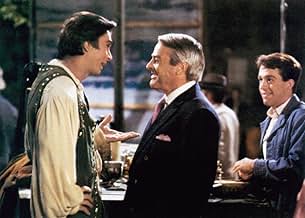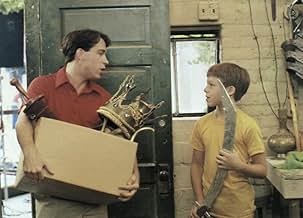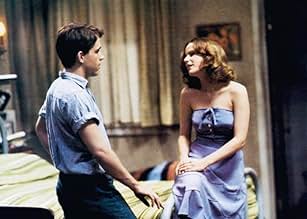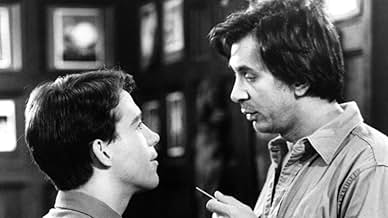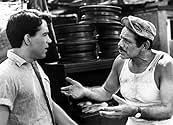Stagestruck adolescent learns about love the hard way while interning in Cleveland summer stock during the early '50's.Stagestruck adolescent learns about love the hard way while interning in Cleveland summer stock during the early '50's.Stagestruck adolescent learns about love the hard way while interning in Cleveland summer stock during the early '50's.
Tom Hulce
- Artie Shoemaker
- (as Thomas Hulce)
- Director
- Writer
- All cast & crew
- Production, box office & more at IMDbPro
Featured reviews
I originally saw this film while I was working as a musician doing musical theatre in summer stock. If you've ever done any work in theatre - especially at a summer stock theatre - you'll really enjoy this film.
Yes, there are some moments of really bad writing in the film, but overall it's a lovely tribute to the theatre and why people love it.
Yes, there are some moments of really bad writing in the film, but overall it's a lovely tribute to the theatre and why people love it.
This entertaining teen dramedy is a rare thing: a movie about show business that's an argument for the nobility of "normalcy". A pre-mumblecore indie that has many of that genre's pluses (naturalism, relatable emotions, clear goals) without its big minus: bad / no written dialogue. Hulce nails the wide-eyed naivete, but Langella is the scene-stealer; ridiculous, wise, unhinged, egotistical, & fragile. With a great ending, it's a solid little forgotten 80s sleeper that surpasses its amateurish moments.
10SHAWFAN
And what is its genre? The backstage expose story; what theatrical life is really like behind those Broadway (and other) curtains. It certainly has a lot of competition: Singin' in the Rain both I and II (1929 and 1952), 42nd Street, Golddiggers of (You name the year.); Dames of 1934; Noises Off (1992) from the farcical side and A Star is Born I and II from the 1930s and the 1950s from the tragical side: not to mention Summer Stock of 1950: the list keeps rollin' along. So what makes this movie so special? And why are there so few comments about this stunningly great movie? Have so few people actually seen it? How amazing to see a younger Frank Langella pre-Dracula and pre-Frost-Nixon by 30 years! How amazing to see the fresh and talented Tom Hulce so pre-Amadeus! And yet another superb Stiller! What a wonderful line-up of talented people at their very best from so long ago! And such a script! Who was this David Shaber? So full of realistic disillusion and pathos compared to the usual sentimentality and feel-good comedy! As especially exemplified by the Star-Is-Born-like episode where the heroine achieves Broadway while the Langella character has to content himself with still another provincial tour.
Langella's subsequent hysterical and sadistic blowup against the star-struck Latin teacher and his granddaughter in which he vents his fury and frustration is just one of many fantastic and psychologically real moments in the film. (The Latin teacher and his love affair with backstage life certainly echo Marlene Dietrich and her seduced professor in The Blue Angel of 1929.) Another in the series of mercenary and cold-hearted agents like the late Kevin McCarthy who was preceded by Burt Lancaster in The Sweet Smell of Success (1957) and succeeded by Alan Alda in Clubland (2001) in movie history. The sexual liberation of the Hulce character recalls similar incidents in O'Neill's great comedy Ah, Wilderness.
And what a tribute to the vanished operettas of long ago: The Red Mill of Victor Herbert; Rose Marie and The Vagabond King of Rudolf Friml; The Desert Song of Sigmund Romberg etc. What satirical insertions of bits from the great plays like Romeo and Juliet. Tributes to the theater itself as expostulated by the star Langella. The richness and depth of this movie are simply endless. And to be saddled by such a title! Who could have an inkling of what this great movie is about from such a ridiculous and unsuggestive title? But on the other hand, what title could one have applied to such a magnificent drama which might have lived up to its stirring, emotional content?
PS: I just saw (2009) Frank Langella in his latest acting spectacular: as Richard Nixon in Frost-Nixon. How this great actor after 30 years simply goes from triumph to triumph!
Langella's subsequent hysterical and sadistic blowup against the star-struck Latin teacher and his granddaughter in which he vents his fury and frustration is just one of many fantastic and psychologically real moments in the film. (The Latin teacher and his love affair with backstage life certainly echo Marlene Dietrich and her seduced professor in The Blue Angel of 1929.) Another in the series of mercenary and cold-hearted agents like the late Kevin McCarthy who was preceded by Burt Lancaster in The Sweet Smell of Success (1957) and succeeded by Alan Alda in Clubland (2001) in movie history. The sexual liberation of the Hulce character recalls similar incidents in O'Neill's great comedy Ah, Wilderness.
And what a tribute to the vanished operettas of long ago: The Red Mill of Victor Herbert; Rose Marie and The Vagabond King of Rudolf Friml; The Desert Song of Sigmund Romberg etc. What satirical insertions of bits from the great plays like Romeo and Juliet. Tributes to the theater itself as expostulated by the star Langella. The richness and depth of this movie are simply endless. And to be saddled by such a title! Who could have an inkling of what this great movie is about from such a ridiculous and unsuggestive title? But on the other hand, what title could one have applied to such a magnificent drama which might have lived up to its stirring, emotional content?
PS: I just saw (2009) Frank Langella in his latest acting spectacular: as Richard Nixon in Frost-Nixon. How this great actor after 30 years simply goes from triumph to triumph!
It's understandable that one reviewer called the show scenes in the movie,"musicals", and Hollywood did make screen musicals of them. But they are excerpts from the genre of operetta. This was a pre 1940 style of "light comic" music drama, originating in Europe, at the turn of the century. Among the leading composers were Franz Lehar, and Victor Herbert. The cast had to have operatic voices, and sing, not talk the song a la Rex Harrison in "My Fair Lady". Of course in direct rebutal, to what I just said, Frank Langella, a non singing actor, sings "Someday", in a sotto voce (soft) style a la Perry Como. If someone says, "Summerstock, and operetta", and you go, "Huh?", this is not the movie for you, which is why about seven people saw it. This was summer live musical theatre, where youngsters with stars in their eyes, and pros who were never superstars, performed operetta classics in local theatres all over the country, like "The Merry Widow", "Rose Marie", and "The Desert Song". The plots are corny and ludicrous....but the songs...."Someday", "One Alone", "One Kiss", make me cry, because I remember how long ago it was when I first heard them and their beauty captures me more and more. Frank Langella is wonderful, as the romantic male lead in all the shows, who you know is not going to make it to stardom. Glynnis O'Connor, as the ingenue who breaks Tom Hulce's heart is impressive, and to show what an unstable field showbiz is, imdb has no credits for her from 98 to 02. I think Tom Hulce is a highly underrated actor. There's something so endearing about him, but the great roles don't seem to be offered to him today. I own this film and I've watched it over and over. As the pros say, "highly recommended".
In the early 1950's, young college student Tom Hulce takes a summer job as the prop master for a summer stock theater company in Cleveland, Ohio. He finds himself pulled away from his Pre-Med studies and towards the theater, partly by his friendship with struggling New York actor Frank Langella and partly through a romance with dancer Glynnis O'Connor.
You basically know how this movie will play out. Hulce's father, the great Jerry Stiller, will pressure him to focus on school, but he won't listen, but then a great reversal will drive him back to his old life before a compromise is reached at the film's climax. It's all formula and this film really doesn't deviate from it.
That's not really a bad thing. Formulas exist for a reason and how well a formulaic film works has a lot to do with the actors and whatever colour the script adds. This film really doesn't work, and surprisingly it's mostly because of Hulce. He made this between "Animal House" and ":Amadeus", and maybe it's his relative inexperience or maybe he's just woefully miscast, but he's not good in this film and he drags it down.
You basically know how this movie will play out. Hulce's father, the great Jerry Stiller, will pressure him to focus on school, but he won't listen, but then a great reversal will drive him back to his old life before a compromise is reached at the film's climax. It's all formula and this film really doesn't deviate from it.
That's not really a bad thing. Formulas exist for a reason and how well a formulaic film works has a lot to do with the actors and whatever colour the script adds. This film really doesn't work, and surprisingly it's mostly because of Hulce. He made this between "Animal House" and ":Amadeus", and maybe it's his relative inexperience or maybe he's just woefully miscast, but he's not good in this film and he drags it down.
Did you know
- Trivia"The Red Mill" was a famous operetta composed by Victor ("Babes In Toyland") Herbert. It was later filmed as a silent movie starring Marion Davies in 1927.
- GoofsWhen Artie and his father are driving in the truck, discussing Artie's future, passing trees are reflected on the windshield. At the end of the conversation, a street light is reflected that did not exist in 1951 (the setting of the movie).
- Quotes
Harry Crystal: There's one thing you learn in this business, and you keep on learning it: There's always a bigger agent, there's always a better part, and there's always a prettier girl.
- ConnectionsFeatured in TCM Guest Programmer: 15 Fan Programmers (2009)
- How long is Those Lips, Those Eyes?Powered by Alexa
Details
- Release date
- Country of origin
- Language
- Also known as
- Deine Lippen, deine Augen
- Filming locations
- Production company
- See more company credits at IMDbPro
Box office
- Gross US & Canada
- $804,713
- Opening weekend US & Canada
- $63,766
- Aug 17, 1980
- Gross worldwide
- $804,713
Contribute to this page
Suggest an edit or add missing content

